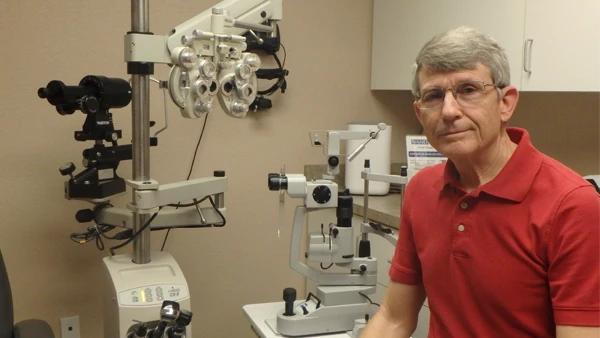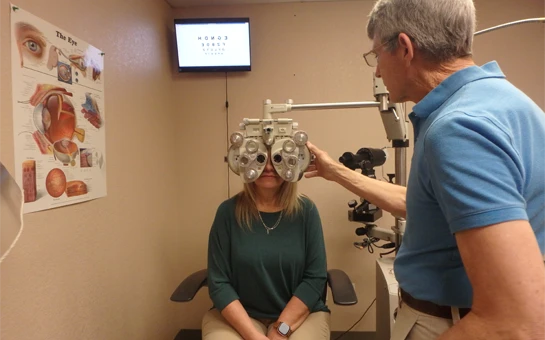Begin Your Journey to Better Vision
Eye Exams
Routine eye exams are essential for detecting vision problems, monitoring eye health, and identifying early signs of conditions like glaucoma or macular degeneration.
Contact Eye Exams
Specialized exams assess eye health, measure for contact lenses, and ensure proper fit and comfort.
Contact Lenses
Thin, curved lenses worn on the eye’s surface to correct vision. They offer a convenient alternative to glasses, providing clear vision and versatility.
Lenses & Frames
Customized lenses paired with stylish frames to correct vision and suit personal style, ensuring clarity and comfort.
Eye Protection
Shields eyes from injury, UV rays, and harmful debris, preserving vision and promoting safety.
Cataracts
Cataracts don't have to cloud your world. Our expert optometrist is here to help you!

Eye Doctor Lawrence KS
Welcome to Curtis R Anderson, OD, which is located in Lawrence KS. We offer comprehensive eye care services to enhance vision and promote eye health. The top-rated Dr. Curtis R. Anderson O.D., has years of experience in providing safe, effective, and personalized eye care to patients in Lawrence KS and surrounding areas. We want to be your Lawrence KS eye doctor.
We invite you to visit our optometry office for a range of services, to achieve and maintain optimal vision and eye health.


Request an Appointment
Welcome To Curtis R Anderson, OD
Our mission at Curtis R Anderson, OD is to enhance the quality of life for our patients by providing exceptional, personalized eye care. We are dedicated to preserving and improving vision through cutting-edge technology, compassionate service, and a commitment to lifelong eye health. Our goal is to empower every patient with the clarity and confidence they need to see the world at its best.
The Importance of Vision Care Even Without Apparent Issues
You may not currently experience any vision problems, but regular vision care is still essential for maintaining optimal eye health. Many serious eye conditions, such as glaucoma, diabetic retinopathy, and macular degeneration, can develop without noticeable symptoms in their early stages. Regular eye exams can detect these conditions early, allowing for timely intervention and preventing potential vision loss. Additionally, eye exams can reveal signs of systemic health issues like diabetes and high blood pressure. By prioritizing routine vision care, you ensure that any underlying issues are identified and managed before they impact your vision and overall health.
The History of Eye Care
The history of eye care dates back thousands of years, with ancient civilizations making significant contributions to our understanding of vision and eye health. In ancient Egypt, around 1550 BC, the Ebers Papyrus documented various treatments for eye diseases, highlighting the early recognition of the importance of eye care. The Greeks and Romans also made notable advancements, with renowned figures like Hippocrates and Galen studying and writing about ocular anatomy and conditions. Their work laid the foundation for future medical practices and the development of specialized eye care.
During the Middle Ages, Islamic scholars such as Alhazen (Ibn al-Haytham) made groundbreaking strides in optics and vision science. Alhazen's Book of Optics, written in the 11th century, challenged earlier Greek theories of vision and introduced new concepts about how light and the eye interact. The Renaissance period saw further advancements, particularly with the invention of spectacles in the late 13th century, which revolutionized the way people corrected their vision. These historical milestones collectively contributed to the evolution of modern ophthalmology and optometry, leading to the sophisticated eye care practices we benefit from today.


What Kind of Training Does an Optometrist Have?
An optometrists undergoes extensive training to become experts in eye health and vision care. Their education begins with a bachelor's degree, typically in a science-related field, followed by enrollment in a four-year optometry program at an accredited optometry school. During these four years, optometry students study various subjects, including optics, visual science, anatomy, physiology, and pathology of the eye. They also receive hands-on clinical training, where they learn to diagnose and manage a wide range of eye conditions, prescribe corrective lenses, and provide vision therapy.
In addition to their formal education, an optometrist must pass a series of rigorous exams to obtain their license to practice. This includes the National Board of Examiners in Optometry (NBEO) exams, which test their knowledge and clinical skills. An optometrist may choose to further specialize in areas such as pediatric optometry, geriatric optometry, or ocular disease through residency programs, which provide an additional one to two years of focused training. Continuous education is a crucial part of their career, as they must stay updated with the latest advancements in eye care and treatment techniques to provide the best possible care for their patients.


Begin Your Journey to Health in 3 Easy Steps



